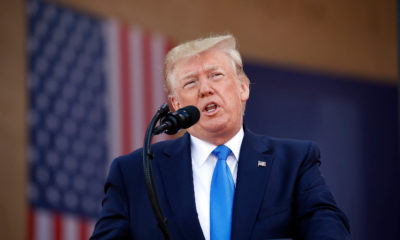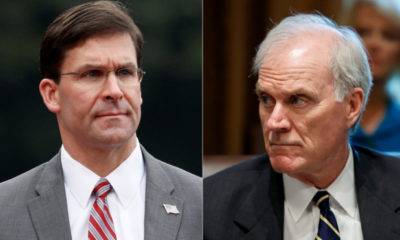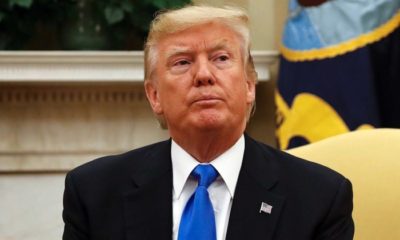World
Nuclear armed Pakistan poses a major terrorist threat: Trump

 Washington: Ahead of the crucial Nuclear Security Summit, Republican presidential frontrunner Donald Trump has claimed he alone can solve the problem of Islamist terrorism with a nuclear armed Pakistan posing a “vital” issue.
Washington: Ahead of the crucial Nuclear Security Summit, Republican presidential frontrunner Donald Trump has claimed he alone can solve the problem of Islamist terrorism with a nuclear armed Pakistan posing a “vital” issue.
“Pakistan is a very, very vital problem and really vital country for us because they have a thing called nuclear weapons,” he said participating in a town hall style meeting in Milwaukee, Wisconsin on Tuesday. “They have to get a hold of their situation.”
“When I see that and when I see it put in a park because it was mostly Christians, although many others were killed other than Christians, I think it’s just absolutely a horrible story,” Trump said, referring to the Lahore terrorist attack.
“But I’m talking about radical Islamic terrorism,” Trump said on the event hosted by CNN. “I will solve it far better than anybody else running” for presidency.
Asked about his comment that he might support Japan and South Korea developing nuclear weapons of their own given his stated concern for nuclear proliferation, Trump said because “North Korea has nuclear weapons” though it “doesn’t have a carrier yet”.
Asked if letting other countries get nuclear weapons, wasn’t proliferation, he said “Maybe it’s going to have to be time to change, because so many people, you have Pakistan has it, you have China has it. You have so many other countries are now having it.”
“At some point we have to say, you know what, we’re better off if Japan protects itself against this maniac in North Korea, we’re better off, frankly, if South Korea is going to start to protect itself, we have,” he said.
“It’s going to happen, anyway,” Trump said. “It’s going to happen anyway. It’s only a question of time. They’re going to start having them or we have to get rid of them entirely.”
“But you have so many countries already, China, Pakistan, you have so many countries, Russia, you have so many countries right now that have them.
“Now, wouldn’t you rather in a certain sense have Japan have nuclear weapons when North Korea has nuclear weapons? And they do have them. They absolutely have them. They can’t — they have no carrier system yet but they will very soon,” Trump said.
Trump’s comments about Pakistan’s nuclear weapons came after a senior administration official expressed renewed concern about the nuclear weapons in a preview of the summit here on March 31 and April 1.
“Our concerns regarding the continuing deployment of battlefield nuclear weapons by Pakistan relate to a reality of the situation,” said Rose Gottemoeller, under secretary of state for arms control and international security.
“When battlefield nuclear weapons are deployed forward, they can represent an enhanced nuclear security threat,” she said.
“It’s more difficult to sustain positive control over systems that are deployed forward. We found this lesson ourselves out in Europe during the years of the Cold War,” she said.
“And so I do think that that is a reality of the situation. It’s not related particularly to any one country,” Gottemoeller said.
“Wherever battlefield nuclear weapons exist, they represent particular nuclear security problems.”
On Friday, Pakistan’s top nuclear security adviser Khalid Ahmed Kidwai rejected calls from the US to curb Pakistan’s reliance on tactical nuclear weapons.
“We are not apologetic about the development of the TNWs (tactical nuclear weapons) and they are here to stay,” he said at a seminar in Islamabad following Gottemoeller’s earlier testimony before the US Senate Foreign Relations Committee.
World
Lockdowns in China Force Urban Communities to Defy Censorship and Vent Frustration Online

Shanghai’s rich middle class is leading a wave of online dissent over the strict and prolonged lockdowns imposed in various parts of the country. Chinese internet censorship is struggling as patience is wearing thin in many urban centers, coming up with creative forms of online protests.
Social Media Posts Revealing Lockdown Tension in Shanghai
Drawn-out lockdowns are nothing new in China as authorities insist with the nation’s zero-Covid policy since the start of the pandemic. Currently over This time around, however, metropolitan areas like Shanghai are increasingly difficult to keep quiet, given that its more than 25 million residents have seen weeks of total isolation along with food shortages and many other service interruptions.
Dozens of towns and reportedly over 300 million Chinese citizens have been affected by lockdowns of different severity. As expected, urban netizens have been most outspoken over their difficulties by finding creative ways to get around state censorship and bans placed on topics, news comments and spontaneous campaigns.
Shanghai residents have been using mobile proxies and hijacking seemingly unrelated hashtags to talk about healthcare issues, delivery failures and the overall severity of their situation. The “positive energy” that the Chinese government wants to transmit during the recent prolonged series of lockdowns does not come naturally to those counting food supplies and online censors are working hard to filter words, trending topics and undesired social media sharing.
WeChat groups and message threads are under constant monitoring. Posts questioning the zero-Covid approach have been quickly deleted, including by leading Chinese health experts like Dr. Zhong Nanshan. Video footage is soon censored and protests and investigations are quickly made to disappear.
Where this has not worked, officials have exposed banners with warnings and outright threats like “watch your own mouth or face punishment”, while drones have been patrolling the city skies. Yet, if anything, this has led to further tensions and unspoken confrontation with Shanghai’s educated and affluent middle class.
Creative Online Solutions Harnessing Civic Energy
Announcements by Chinese social media that they would be publishing the IP addresses of users who “spread rumors” have not helped either. Tech industry research has shown that much of Asia’s tech-savvy population has a habit of using mobile proxies and other privacy tools, quickly finding workarounds to browse the internet freely and talk to the world about the hottest topics.
The sheer volume of forbidden posts is already a challenge for the very censorship system, experts explain. Unable to track all trending hashtags, state workers overlook topics that speak about the US, Ukraine or other popular news. Linking human rights elsewhere to their situation, Chinese online dissidents establish their informal channels and “hijack” the conversation to share personal or publicly relevant information about the Covid suppression in their town.
Sarcastic and satirical posts still dominate. Others hope to evade the censors by replacing words from famous poems or the national anthem. One thing is certain – social media, when harnessed with the right creativity, has proven its ability to mount pressure on the government in even some of the most strictly controlled tech environments like China.























